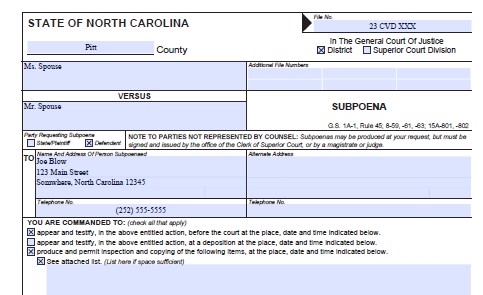What is a Subpoena?
Subpoenas are documents that require a witness to appear in court or at a deposition to testify. A subpoena or subpoena duces tecum (rarely called by that name) may require a witness to provide documents or other evidence, in addition to requiring a witness to appear in court to testify.
What if You Don’t Respond?
A witness must be prepared to testify and/or produce the documents unless and until the judge rules otherwise. A court may hold the witness in contempt of court for failure to comply with a subpoena. A judge has the authority to incarcerate a person who refuses to testify or produce records as required by a subpoena.
The Rules
An attorney (or any interested party) may file a motion to quash (or cancel) a subpoena. The decision about whether materials must be provided, or if a witness must testify, rests with the judge. Sometimes judges will rule there are valid reasons to override the objections to a subpoena. This may be because the information subpoenaed is subject to a privilege, such as attorney-client privilege. Other types of special rules might apply to information requested, such as medical records.
Or, a judge can limit what must be released pursuant to the subpoena. Sometimes judges will ask the person who has the information to “redact” it. Redacting is taking a marker and blotting out certain information, such as the name of the person who reported suspected abuse of a child to Child Protective Services or social security numbers and dates of birth. Judges may review the information “in camera” before making a ruling, which means he or she reviews the documentation in his or her office before allowing any of it to be released to the attorneys.
If You Are Served
A subpoena is usually served on someone by sheriff. Not only can a sheriff hand the paperwork to you, he or she also has the legal authority to serve someone by telephone call. A North Carolina subpoena includes information for witnesses, explaining the duties and rights of a witness. Call an attorney immediately if you are served, and time is of the essence. A court order is the only way to avoid obligations to testify or produce records.
Examples of reasons a court might enter an order if someone makes a proper motion:
The subpoena fails to allow reasonable time for compliance.
The subpoena requires disclosure of privileged or other protected matter and no exception or waiver applies to the privilege or protection.
The subpoena subjects a person to an undue burden or expense.
The subpoena is otherwise unreasonable or oppressive.
The subpoena is procedurally defective.
If you are served with a subpoena and want to know your rights or you need to file a motion to quash a subpoena, contact an attorney. Time is of the essence, especially if you were served shortly before the trial date is scheduled.

